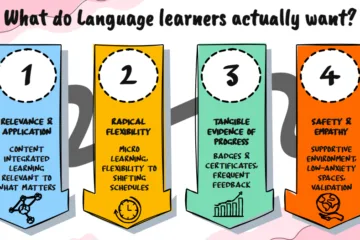Businesses approaching international markets often focus narrowly on translating websites whilst overlooking the comprehensive language capabilities required for sustainable international success. Effective multilingual strategies extend far beyond translated content to encompass team communication capabilities, customer service, sales processes, and operational workflows that collectively determine international business effectiveness.
The website translation starting point
Website translation typically represents businesses’ first international language investment, and rightly so. Your website often provides initial impressions that influence whether prospects engage further or seek alternatives. Professional translation ensures these crucial first impressions reflect your brand quality and business professionalism.
However, website translation alone creates incomplete international presence that generates inquiries you may struggle to handle effectively. Prospects visiting translated websites expect subsequent interactions matching their language preferences, creating demand for broader language capabilities beyond initial website content.
The inquiry handling challenge
Translated websites generate enquiries in multiple languages that require appropriate responses. Businesses unprepared for multilingual customer communications face awkward situations where professional websites promise capabilities that actual operations cannot deliver.
This gap between translated marketing presence and operational language capabilities frustrates prospects whilst wasting website translation investments. Professional website translation should trigger planning for how enquiries generated will be handled appropriately in multiple languages.
The sales process consideration
International sales processes involve multiple interactions from initial enquiry through proposal, negotiation, and closing that require consistent language capabilities. Prospects expect sales conversations matching their language preferences established through translated marketing materials.
Businesses need either sales team language training or comprehensive translation support for all sales interactions. The optimal choice depends on sales frequency, relationship importance, and resource availability. Recurring sales conversations justify team training investments, whilst occasional international opportunities might suit translation service support.
The customer service requirement
International customers expect service in their preferred languages throughout their relationship with your business. Post-sale support, technical assistance, and ongoing communications require language capabilities extending beyond initial sales interactions.
Building sustainable international business requires customer service language strategies addressing how multilingual support will be provided consistently. This might involve training customer service teams in key market languages or establishing translation support for customer communications.
The content marketing strategy
Successful international marketing requires ongoing content creation in multiple languages, not just static website translation. Blog posts, social media, email campaigns, and promotional materials all need consistent multilingual content that maintains brand voice across languages.
Professional translation services handle ongoing content needs efficiently, enabling consistent marketing presence across target markets. However, businesses also benefit from team members who can engage in social media conversations, respond to comments, and participate in online discussions that build market presence.
The internal communication element
International operations often involve multilingual teams, international partners, or overseas offices requiring internal communication language strategies. Documents, presentations, meetings, and collaborative work may need multilingual support for effective operations.
Language training for key team members enables more effective international collaboration, whilst translation services handle formal documents and important communications requiring quality assurance. This combination creates efficient internal multilingual communication without overwhelming translation budgets.
The partnership and supplier coordination
International partnerships and supplier relationships require ongoing communications about coordination, problem-solving, and relationship maintenance. These recurring interactions benefit from direct language capabilities rather than depending entirely on translation intermediaries.
Corporate training that develops language skills for team members managing international partnerships creates communication efficiency whilst strengthening relationships through direct engagement. Meanwhile, translation services handle contracts, formal agreements, and documents requiring legal precision.
The trade show and event preparation
International trade shows, conferences, and business events provide valuable networking opportunities that require real-time language capabilities. These situations favour team members with language training over dependence on interpreters who limit natural interaction.
Businesses participating in international events benefit from advance language training that enables comfortable networking, relationship building, and spontaneous conversations. These capabilities create market presence that passive trade show attendance without language skills cannot achieve.
The progressive capability building
Comprehensive multilingual strategies develop progressively rather than appearing instantly complete. Initial website translation and professional marketing materials establish market presence whilst team language training builds operational capabilities over time.
This phased approach prevents delaying market entry whilst capabilities develop, providing immediate professional presence through translation services whilst investments in language training create long-term operational competencies that reduce translation dependency progressively.
The resource allocation framework
Smart businesses allocate language resources strategically between translation services and team training based on specific requirements and priorities. Marketing content, legal documents, and public-facing materials typically warrant professional translation, whilst recurring communications and relationship building benefit from team language capabilities.
This allocation framework prevents wasteful spending on unnecessary translation whilst ensuring professional quality for content representing your brand publicly. Different content types and communication situations require different language solutions within comprehensive strategies.
The competitive differentiation
Comprehensive multilingual capabilities create competitive advantages that partial language strategies cannot achieve. Competitors with only translated websites but no operational language capabilities remain limited compared to businesses offering complete multilingual customer experiences.
This differentiation becomes increasingly important as more businesses enter international markets with basic translation. Companies building deep multilingual capabilities through combined translation services and team training establish superior competitive positions that basic website translation alone cannot create.
The measurement and optimisation
Effective multilingual strategies include measurement systems tracking which language investments produce best returns. Website translation effectiveness appears through traffic and conversion metrics, whilst team language capabilities show through improved client relationships and sales outcomes.
This performance data enables continuous optimisation that refines language investment allocation over time. Businesses can increase training investments where team capabilities prove valuable whilst maintaining translation services for content types requiring professional native-speaker quality.
At The Chat Laboratory, we help businesses build comprehensive multilingual strategies that integrate our professional translation services for content needs with our language training programmes that develop team operational capabilities. This integrated approach creates complete language solutions rather than piecemeal responses to isolated requirements.
Our translation services handle websites, marketing materials, business documents, and content requiring professional native-speaker quality. Our language courses develop team capabilities for client interactions, sales processes, customer service, and operational communications that benefit from direct multilingual engagement.
Building effective multilingual business strategies requires thinking beyond website translation toward comprehensive language capabilities that support all international business activities. This strategic approach creates sustainable competitive advantages rather than superficial international presence that cannot support actual business operations.



0 Comments